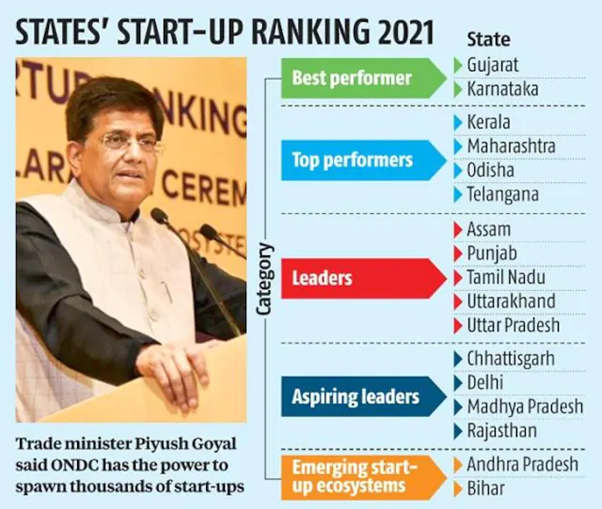Start-up India-1.0
Relevance
- GS Paper 2 Important aspects of governance, transparency and accountability, e-governance, applications, models, successes, limitations, and potential;
- Government policies and interventions for development in various sectors and issues arising out of their design and implementation.
- Tags: #startupIndia #scheme #currentaffairs #upsc.
What is the Start-up India Scheme?
The Startup India scheme, launched on January 16, 2016, is a significant government initiative to promote and support startups in India by facilitating access to bank financing. This initiative was inaugurated by the former Finance Minister, Arun Jaitley, and is overseen by the Department for Promotion of Industry and Internal Trade (DPIIT).
The primary objective of Startup India is to eliminate certain restrictive state government policies, including:
- License Raj
- Land Permissions
- Foreign Investment Proposals
- Environmental Clearances
The Startup India scheme is built on three major pillars:
- Funding Support and Incentives: This pillar focuses on providing financial support and incentives to startups across the country.
- Industry-Academia Partnership and Incubation: It aims to foster collaboration between industries and academia, as well as support the incubation of innovative startup ideas.
- Simplification and Handholding: This pillar aims to streamline processes and provide guidance to startups, making it easier for them to navigate regulatory and operational challenges.
Registration under the scheme
To register your business under the Startup India scheme, follow these important steps:
- Incorporate Your Business: First, incorporate your business as a Private Limited Company, Limited Liability Partnership (LLP), or Partnership Firm. Ensure you obtain the Certificate of Incorporation, PAN (Permanent Account Number), and fulfill other necessary compliances.
- Visit the Official Website: Access the official Startup India website and log in to your account. On the website, complete the registration form by providing all the essential details about your business and upload the required documents.
- Required Documents: You will need to submit essential documents, including a Letter of Recommendation, Incorporation/Registration Certificate, and a brief description of your business.
- Recognition by DIPP: Startups are eligible for income tax benefits, but they must be officially recognized by the Department of Industrial Policy and Promotion (DIPP) to avail these benefits. Additionally, they should receive certification from the Inter-Ministerial Board (IMB) to qualify for intellectual property-related benefits.
- Receive Recognition Number: Once the registration is successfully processed and the documents are verified, you will receive a recognition number for your startup. You will also be provided with a certificate of recognition.
Eligibility under the scheme
Eligibility for the Startup India scheme is based on the following criteria:
- Type of Entity: The entity must be incorporated in India as a private limited company, partnership firm, or a limited liability partnership.
- Age of the Entity: The entity should have a history of less than 10 years, meaning that it should be incorporated or registered for less than a decade from the current date.
- Turnover Limit: The entity’s turnover for all financial years since its incorporation or registration should be below INR 100 crores.
It’s important to note that an entity created through the division or reconstruction of an existing business is not considered a ‘Startup’ under this scheme.
Benefits under the scheme
The Startup India scheme has introduced several benefits to foster entrepreneurship and innovation in the country. Here are some of the key advantages:
- Reduced Patent Registration Fees: Startups enjoy reduced fees for patent registration, making it more affordable to protect their intellectual property.
- Improved Bankruptcy Code: The scheme ensures a 90-day exit window in the Bankruptcy Code, simplifying the process for startups.
- Tax Benefits: Startups are granted a 3-year exemption from capital gains tax, reducing the financial burden during the initial years of operation.
- Innovation Hub: An innovation hub is established under the Atal Innovation Mission, promoting creativity and entrepreneurship.
- Promoting Innovation in Education: The initiative targets 5 lakh schools and aims to involve 10 lakh children in innovation-related programs, nurturing innovation from a young age.
- IPR Protection: New schemes are developed to provide intellectual property rights (IPR) protection to startup firms, safeguarding their innovations.
- Encouraging Entrepreneurship: The scheme aims to encourage entrepreneurship throughout the country, fostering a culture of innovation and business development.
- Global Recognition: By supporting startups and creating an enabling environment, Startup India seeks to promote India as a global hub for startups, attracting attention and investments from around the world.
Startup Ranking 2021
States’ Startup Ranking is an initiative under the Start-up India program by the Government of India. It is conducted by the Department for Promotion of Industry and Internal Trade (DPIIT) under the Ministry of Commerce and Industry. The primary objectives of this ranking exercise are:
- Showcasing Progress: To highlight the efforts and progress made by various states and union territories (UTs) in promoting a conducive ecosystem for startups.
- Fostering Competitiveness: Encouraging states and UTs to proactively work on improving their startup ecosystem, making them more competitive.
- Sharing Best Practices: Enabling states and UTs to identify, learn from, and replicate successful initiatives and practices from one another.
States and UTs are categorized into five groups based on their performance, which include Best Performers, Top Performers, Leaders, Aspiring Leaders, and Emerging Start-up Ecosystems.
In the 2021 rankings, participants were evaluated across seven broad reform areas, each consisting of 26 action points. These reform areas cover various aspects of support for startups, including institutional support, fostering innovation and entrepreneurship, access to markets, incubation support, funding support, mentorship, and capacity building for enablers.
The results of the 2021 rankings saw Gujarat and Karnataka as the Best Performers in the States category, while Meghalaya ranked the highest among UTs and northeastern states. Kerala, Maharashtra, Odisha, and Telangana received recognition as Top Performers among the states, and Jammu and Kashmir was the top performer among UTs and northeastern states. This ranking exercise helps promote healthy competition and improvements in the startup ecosystems across the country.
Challenges in the startup schemes
- Access to Funding: Startups often face difficulties in securing adequate funding, especially in their early stages.
- Regulatory Compliance: Navigating complex regulations and compliance requirements can be burdensome for startups.
- Market Competition: Fierce competition and market saturation can make it challenging for startups to establish themselves.
- Lack of Skilled Talent: Attracting and retaining skilled talent is a common challenge for startups.
- Infrastructure and Resources: Access to modern infrastructure and resources can be limited, particularly in smaller cities.
- Intellectual Property Protection: Protecting intellectual property can be costly and complex for startups.
- Global Expansion: Expanding globally while complying with international regulations can pose challenges.
- Exit Strategy: Formulating a viable exit strategy is crucial but often overlooked.
- Government Bureaucracy: Navigating government processes can be time-consuming and challenging.
- Market Demand: Assessing and responding to market demand can be uncertain and dynamic.
Mains Question
Examine the impact of the Startup India scheme on fostering entrepreneurship, innovation, and economic growth in India.





